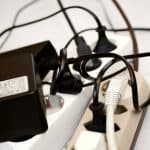There are days when we absent-mindedly leave the keys in the ignition, and the car battery is discharged.
That’s the point we contemplate if an old 12v 4A laptop charger or 16v power supply could charge the battery enough for one crank. Are they adequate? Is it dangerous?
So, can a 12v power supply charge a car battery?
A 12V power supply can charge a car battery, although this wouldn’t be the safest or most efficient way to do it. In practice, you need more than 13V to charge a nominal 12V car battery.
Generally, most people use a fast charger or maintenance charger for car batteries. There are several sizes of chargers on the market because needs vary.
Nevertheless, the crucial thing about charging a car battery is to know how many amps the power supply is charging with.

NiCad batteries (Nickel cadmium) need accurate and constant current whereas lead acid batteries need accurate constant voltage.
Car batteries are lead acid batteries. There are three stages to charging a typical car battery:
- Constant Current: In the first stage, the current is limited, and the voltage rises gradually.
- Constant voltage: In the second stage, the voltage stays put, and the current decreases to zero.
- Float stage: In the final stage, the current and voltage are limited.
Conventional car chargers are dynamic and intelligent charging systems.
They vary the charging voltage based on the state of charge. A power supply with fixed output voltage can get the job done. But it is not the ideal replacement for maintaining or charging a car battery.
In this post, we discuss the brass tacks of charging a car battery and how a 12v power supply measures up to the task.
Understanding Car Batteries and 12v Power Supplies
A 12-volt battery is the industry standard or ‘stock’ battery in cars or automobiles. It is a starter battery that differs from a deep cycle battery, as discussed in a previous post. A 12v car battery has six cells with 2.1 volts when fully charged.
A 16v car battery has 8 cells – two additional cells – giving it a full charge voltage of 16.8 volts. These hot spark batteries are generally used in race cars for an extra boost.
- We’ll stick to the 12v variety for the most part of this article.
Most cars use 12v lead acid batteries, which are called storage batteries. Simply put, they can store a charge but they don’t generate any voltage by themselves. The battery needs a power supply or a charger for this purpose.
The charge helps with the forming voltage of 2.1v per cell.
If we do the math for a 12v battery, we get 2.1 volts x 6 cells = 12.6 volts. In other words, a fully charged car battery measures 126 volts.
If you use a power supply to charge the battery, it should have a terminal voltage higher than 12.6v. Most car battery chargers found in today’s retail market are set to 13.6 volts.
Can a 12 v power supply charge a car battery?
As discussed, In theory, a 12V power supply can charge a car battery, although this wouldn’t be the safest or most efficient way to do it. In practice, you need more than 13V to charge a nominal 12V car battery.
The charging source can become a sink if you charge a battery with insufficient voltage. That’s because the current requirement increases as the car battery gets charged. At one point, the battery stop charging because it needs more current than the charging source can provide.
In other words, the battery wants more current as soon as the battery’s resistance goes under the charger’s internal resistance.
At this point, theoretically, the battery will start charging the charger because the current flow is reversed. Luckily, all chargers have a diode to prevent this.
If you use a 12 volt power supply for the lack of a better option, remove the battery from the engine bay to avoid damage to the electronics.
Charge the battery in a well-ventilated space at room temperature. Wear gloves, eye protection, and other safety gear.
Keep an eye on the voltage/current and battery temperature while charging.
It could be sufficient to get a crank after a few hours. Most 12v DC power supplies like adapters have over-current protection. So, using one should not be problematic as long as the battery isn’t heating up.
However, it is hard to predict the outcome. Lead acid batteries are dangerous and not something to take lightly. You are better off getting a cheap charger from the auto parts store near you.
Check out this YouTube video that shows how to charge a car battery.
Can you charge a car battery with a laptop charger?
Let’s be clear, a laptop charger is not really a charger. It is a power supply.
The charging mechanism is in the laptop. The laptop charger will only draw the correct voltage from the source (mains) and put it out to the device. It has protection so that it shuts down if there is any overload.
However, a laptop charger is not designed to charge any Ni-Cad or Lead-acid battery by itself.
It can put up 19V at maximum current, which is a lot less than what a car battery needs. The protection circuits will kick in if the battery pulls higher current, causing the adapter to shut down.
This protects the battery and laptop charger, so there should be no damage.
You could use a DC-DC converter with a laptop adapter to achieve a charge. But you need proper programming to execute the three stages of charging a car battery (current-constant, voltage-constant, and float).
In short, it’s a lot of know-how, cost, and effort – not recommended.
How long does it take to charge a car battery with a 12v charger
It can take up to 12 hours to get a full charge on a car battery with a 12v/10A charger.
The amount of time depends on how drained the battery is and the current capacity of the power supply. If you are recharging your battery, turn off the car along with all the electrical devices.
Slow charging is the best way to ensure that the battery doesn’t get heated up while charging. If the battery is dead and does not accept a charge for 24 hours, the method will not work.
Can you use a 12v power supply on a 16-volt battery
A 12v power supply is not capable of charging a 16-volt battery.
A 12v power supply can also raise the battery voltage to 12v. A 16v battery needs more than that.
A 12v charger won’t do. This form of “under-volting” is generally harmless. Damage to components may occur when you raise the voltage higher i.e., a 16V power supply on a 12-volt battery.
Can you charge a car battery with a lower voltage charger (will it work with an underpowered charger)
A typical low-voltage charger can’t fully charge a car battery as it will not accept the charge.
The battery won’t even bother with any power supply below 9v. You can use a relatively low-voltage charger to bring it to the supply source level.
However, this will take a long time. Plus, you won’t know until 24 hours if it made any difference if it is a dead battery.
Lead acid batteries have chemical reactions that don’t relate to a fixed internal resistance.
In theory, you could charge a car battery with 1 Amp of current if you really wanted to. The problem is when the charge builds up and resistance decreases. So, trying to do this would only be helpful for emergency charging.
Even then, it’s better to get a car battery charger.
Can you recharge a completely dead car battery?
You can use a 12v power supply to charge a car battery.
In fact, if your car is in good condition, you can completely recharge a dead battery.
The best thing to do is to push start or jump start the car using a charger. Switch off all electrical devices and let the car run with the engine idle.
In Conclusion:
From a fault in the electrical system to leaving the headlights on, a car’s battery can go flat for a number of reasons.
Add frigid winters and wear and tear and you have something sinister waiting around the corner.
I have covered the brass tacks about whether or not to use a 12v power supply. Personally, I recommend using genuine lead-acid battery chargers for car batteries.
If you can spare the cash, a current/voltage limited power source can also come in handy in many ways.
Don’t forego safety measures while dealing with car batteries. They are potent and dangerous and must be treated with respect. The acid in lead-acid batteries can cause severe harm, and an overcharged battery can release flammable gas.




